Burn History Books!
No doubt the call to burn History books reminds us of some the darkest times in European History of the 20th century. I am very well aware that such calls led in the past to perverse actions and heinous crimes, nothing short of sacrilege. And yet, some books trigger such strongly negative feelings in me that I would rather see them burned. These are the History books produced by the Greek government and distributed to innocent schoolchildren. Once the books reach the classroom the teacher has no option but to agree with the content. Plurality of opinions is not allowed and in some instances it is punishable. Recently a friend, who informed her pupils of the fact that the Kryfo Scholeio (underground schools organized by the Orthodox Church in the Ottoman empire) was a fiction. The result was a caution from the Headmaster. If she repeated the comment she would lose her job. As historians are not rebels, she complied.
A question to be explored is how are these “official” opinions formed? It is evident that schoolbooks are written by professional historians. And there is no doubt that they have the qualifications to deliver work of the highest standard (well, at least some of them). However, we should not forget that schoolbooks are commissioned by the Ministry of Education and Religion. The minister himself is appointed by the government after the elections and, in principle, he reflects the wishes of the electorate. Let us see, though, who manipulates the opinions of this electorate.
On March 25th 2007 I was teaching in Leicester. Spring was arriving late and I started feeling homesick. I wanted to reconnect with my home country. So, I decided to attend mass in the Orthodox church in Nottingham. After all, 25th of March is both a religious and a national holiday back home. Upon arrival I rejoiced in the familiar scent of incense and I relished the chance to speak Greek again. But my happiness did not last long. The priest decided to preach us against the new fifth grade history school book. Among his statements there was one that hit home! He claimed that historians are not qualified to write history. Only the Church can really know what happened in the past. As I looked around me I noticed that nobody reacted. I stood up and left in indignation. Later I found out that the debate about the new book has caused hysterical fits among the Greek population. It still does! In several internet forums you will find comments by doctors, lawyers and other members of the Greek intelligentsia, all of them attacking the poor fifth grade book (which has been “burned” in a way). An intelligentsia brought up with already obsolete (and even dangerously nationalistic) views of our historical past.
It is obvious that the well-known academic authors insulted some vital part of Greek psyche. A psyche formed by religious propaganda and governmental policies. An ideological web whose origins we trace in previous history schoolbooks, written by extreme nationalists. And I am wondering if it is not the right time for historians to leave their comfortable nests and try to reach people. It is never too late to explain their views, analyze their data and even try to teach some of these analytical skills. Internet certainly expands our horizons and provides new opportunities. Along these lines all schoolbooks should be withdrawn from circulation (OK, burning them maybe somewhat extreme). Instead, teachers can use a variety of ancient sources and modern bibliography, which present different views of history. The sources should be approved by an academic committee without political affiliations, which will safeguard the quality of the material. Then, internet can be used not only as an information platform but also for extensive discussions. Only this way, our pupils will start developing their analytical thinking. Unless, of course, this is what governmental and religious institutions in Greece are afraid of.

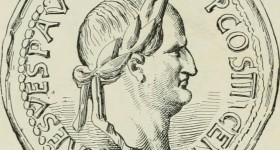
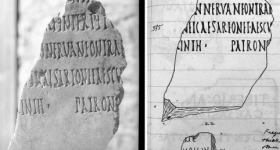
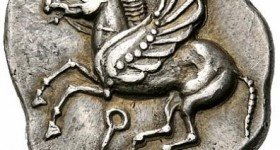

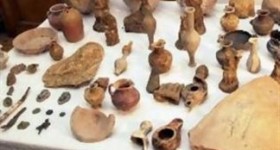
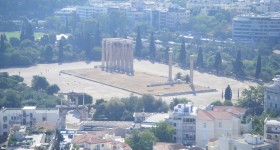

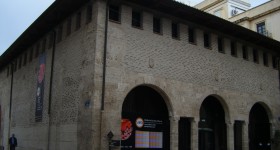

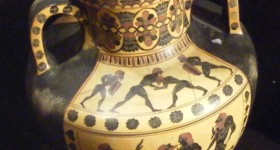
Very good post Constantina. But you shouldn’t be surprised…remember last year’s summer holiday motto…’Live your myth in Greece’. Greeks love myths more than history…
Paramythiazomaste, indeed. Is it not time, though, to start changing?
It is high time indeed! And I agree, the ‘power of the Internet’ will bring changes in the learning and teaching process. For an additional reason: The masses of information on the Web has provided numerous routes and sources to knowledge and has challenged the authority of the school/teacher.
I am not sure though about the ‘approval of the sources’ by an academic committee. Do you mean approving what Web content to use at school? Or have I misinterpreted you? Given the dynamic and ever growing nature of the Web, that would be an almost impossible task and, from my point of view, an undesirable one, because it would replicate the weaknesses of the existing centralised process of the country’s ‘national education’ (as it was called till recently).
Instead, I’d be for giving teachers the freedom and flexibility to use web content and developing pupils/students’ skills of critically evaluating it.
I should add that although the Web has challenged the authority of the school/teacher, yet it has highlighted the need for authority! It is not the need for authority that has been challenged (I’d say it has increased), but the process of creating that authority and who is involved in the process.
The reason I suggested a centralised committee is the complete inability of some of the teachers to… teach. I remember I was a pupil in a Classical High School (an institution that no longer exist). Our history teacher was, in fact, a laureate of German Literature. Suffice to say that I had acquired more historical knowledge than her by the age of 15. These people need guidance. We cannot rely on them to pick sources and books. They would not know where to start from. Also, there is a possibility that some of the teachers hold strong political beliefs that may affect their judgment. I am not saying that a historian should live in a political void. Only that fanaticism should be restricted.
We don’t have the same problem in the UK with the church claiming authority over historical truth, but there are similar tensions over the way history is taught in schools. Its place in the curriculum is frequently justified by referring to the importance of historical knowledge in teaching children about their national identity, duties as a citizen etc. – but most of that is more like ‘myth’ than ‘history’, and true historical study would spend much more time examining and demolishing the sorts of ‘history’ that are used to legitimise dubious political decisions, attitudes towards immigrants and so forth. Of course that sort of thing is then accused of ‘politicising’ the past, as if the officially-sanctioned approach is objective and value-netural. Before we can decide what history should be taught and how it should be taught, there needs to be more of an agreement about *why* it’s important to teach history, rather than the current fudge whereby historians pay lip service to the claim that it’s socially beneficial whereas they really believe in the importance of teaching critical historical skills.
Hi Neville,
I am intrigued. So, I am not going to let you get away with it. Why do you think history should be taught?
I would say that there are three main reasons. Firstly, as a means of teaching skills of critical reading and analysis. Secondly, as a means of understanding the way the world works – history draws together politics, economics, sociology etc. and studies their development and interaction over time, rather than solely in the abstract and timeless world of theory. Thirdly, as a means of understanding how people work – we are historical animals, we develop a sense of identity from the past and so it shapes our decisions and actions (yes, this is basically Nietzsche’s analysis in ‘The Uses and Disadvantages of History for Life’).
I agree with guidance and training. I also agree with ‘suggested readings’. I disagree with banned or forbidden readings/sources/websites, if it would come to that. And I am yet to meet someone whose judgement is not formed also by political/societal/religious/whatever else beliefs!
For me, the key thing is acknowledging where one comes from; equally acknowledging the context of a reading/source/website.
(I’d like to think that the majority of teachers are not driven by fanaticism…)
The ideal remedy is better teachers. In history, this means teachers who know the subject, who have engaged in historical controversies and who have the confidence to put several points of view before their students and to encourage debate. But of course, there are not enough people like that who wish to teach. I also wonder whether we should do more to encourage students to value argument, and those in authority to put up with it. Having said that, I have never found a taste for argument lacking in the students to whom I teach philosophy.
One indirect approach would be to spend some time on the history of a country to which most students did not have much emotional attachment. Students could learn the value of the critical use of sources and of historians’ interpretations in that context. Then they could come back to the study of their own country’s history and apply their new-found skills.
The idea that there should be any state-prescribed list of history textbooks horrifies me. But I have lived all my life in England, a country that has not been at civil war for 350 years nor invaded and conquered for nearly 1,000 years. Such advantages make it much less likely here than in some other countries that the content of history lessons will inflame passions. And any guilt about the British Empire that might be inculcated is synthetic and weak, so hardly worth opposing with demonstrations on the streets.